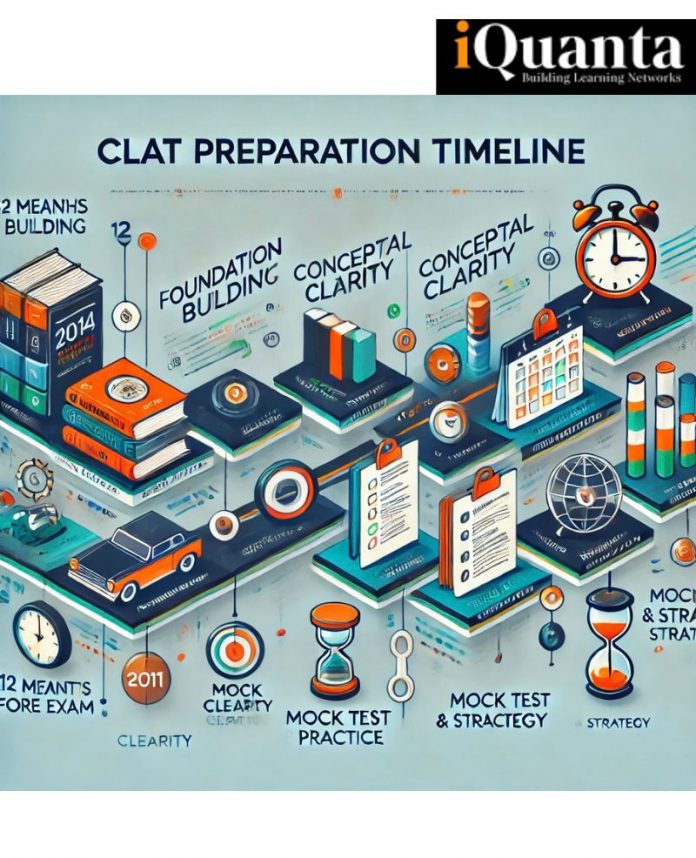One of the most difficult tests for law students in India is the Common Law Admission Test (CLAT). As the test is set for December 2026, prospective applicants need to carefully consider how they would prepare. Consistent work, effective time management, and a well-thought-out plan are essential for success. This blog offers a thorough month-by-month CLAT 2026 study guide that covers every exam section and gives you a well-thought-out plan to follow. By the time you finish reading this blog, you will have a clear path.

Study Timetable for CLAT – December 2024 – March 2025: Build Your Foundation:
Focus: Basics of English, Logical Reasoning, and Math
Building a solid foundation in the exam’s major sections is the aim of your initial preparation. In the first several months, you should focus on the following:
- English: Work on improving your vocabulary and grammar. Practice reading comprehension strategies, comprehend the organisation of passages, and increase your accuracy and speed. Develop your vocabulary and comprehension skills by reading editorials from reputable publications such as The Hindu and Indian Express.
- Logical thinking: Start answering simple thinking problems and enquiries on number series, analogies, direction sense, and puzzles. Recognise the patterns of reasoning and logical progression in each kind of inquiry.
- If you decide to pursue with mathematics, begin with fundamental arithmetic and concentrate on subjects like ratios and proportions, time and effort, averages, and percentages. Gaining familiarity with the kinds of questions that are commonly asked in CLAT is the goal here.
- Current Affairs: Make it a daily habit to read newspapers. To keep track of significant events in both domestic and foreign affairs, as well as crucial government policies, begin taking brief notes.
- Get acquainted with the fundamental framework of general knowledge (GK). Start with the most static subjects, such as general geography, significant historical occurrences, and the Indian Constitution.
Key Tasks:
- Create and follow a daily study schedule.
- Practise answering simple problems in all subject areas, including maths.
- Make it a daily habit to read for at least half an hour.
- Start practicing precision and quickness, particularly in maths and logical reasoning.
Get Free CLAT Study Material
CLAT Study Plan – April 2025 – June 2025: Strengthen Your Concepts
Focus: Complete Your Syllabus, Enhance Conceptual Understanding
By now, your basics should be in place, and it’s time to start strengthening your concepts and deepening your understanding of each section.
- English: Start reading increasingly difficult texts and working on various comprehension exercises. For the English portion, concentrate on honing your critical thinking abilities. Learn terms in context and how they are used in different contexts to increase your vocabulary.
- Logical thinking: Address more complex thinking problems, such as critical reasoning, syllogisms, blood relations, and seating arrangements. To become accustomed to answering questions under pressure, it is important to begin practicing timed sections.
- Legal Reasoning: Begin by concentrating on the part on legal reasoning, comprehending the legal ideas behind each chapter, and rehearsing questions that are relevant. Spend some time learning about important court rulings, legal doctrines, and how passage-based questions apply them.
- Math: Keep improving your problem-solving abilities and concentrate on important subjects like probability, time and distance, and simple and compound interest. To gauge the degree of difficulty, begin answering questions from prior years.
- Current Affairs and GK: At this point, you ought to be reviewing significant national and international topics as well as government policies. Continue taking brief notes and begin relating current affairs to historical, legal, and economic ideas.
Key Tasks:
- Complete the syllabus for all sections.
- Take sectional tests to identify your strengths and weaknesses.
- Analyse your performance in tests and refine your strategy.
CLAT Preparation Strategy – July 2025 – September 2025: Expand and Practice
Focus: In-depth Practice, Mock Tests, and Revision
In this phase, you’ll need to expand your preparation and start applying your knowledge to real-time practice. By this time, your conceptual understanding should be strong, and it’s time to put your learning to the test.
- Current Affairs: Set aside a substantial amount of time to update and revise your understanding of current affairs. Commence concentrating on subjects from January 2024 and be informed about changes in the legal, political, economic, and athletic spheres.
- Mock Tests: Make mock tests more frequent. Every seven to ten days, take at least one sectional mock. Examine your performance in detail to pinpoint your areas of weakness.
- Static GK: Review all of the static GK subjects with an emphasis on historical occurrences, important constitutional clauses, seminal court rulings, and noteworthy world events. Connect your current affairs notes to static GK using your notes.
- Legal Reasoning: Concentrate on answering last year’s legal reasoning questions. Get to work analysing the ramifications of current events and applying legal ideas to them.
Key Tasks:
- Solve multiple mock tests.
- Begin reviewing and analyzing mocks to track your progress.
- Focus on improving weaker sections.

October 2025 – November 2025: Mock Season
Focus: Full-Length Mocks, Final Revision, and Accuracy Improvement
The final phase is when you need to shift to full-length mock tests. These months are crucial as they help you simulate the exam day experience and work on refining your strategy.
- Mocks: By the end of November, complete ten to twelve full-length mocks. This will assist you in evaluating your exam strategy, time management, and preparation.
- Analysis: Carefully examine every practice exam. Determine which aspects of your score are poor, then concentrate on increasing your accuracy in those areas. Monitor your performance in each area and adjust your strategy as necessary.
- Current Affairs and GK: Pay close attention to updating current affairs notes and static GK on a regular basis. Refresh your understanding of current affairs, international relations, and governmental policies.
- Legal Reasoning and Other Sections: Give revision more importance than picking up new knowledge. Review difficult problems, especially those involving legal reasoning, and work on your arithmetic and logical reasoning skills further.
- Rest and Mental Health: Stress levels may increase throughout this period. To stay alert and attentive, make sure you take enough pauses, control your stress, and get enough sleep.
Key Tasks:
- In mocks, try to perform consistently.
- Make frequent revisions, paying particular attention to current events and legal rationale.
- Concentrate on increasing your accuracy and speed, particularly in challenging areas.
Last Words on Maintaining Consistency for CLAT 2026 Preparation:
- Weekly Objectives: To keep yourself focused, set weekly goals for your preparation and monitor your progress.
- Review: Set out Sundays to go over errors, analyse mocks, and improve your approach.
- Balance: Don’t overlook other obligations, such as board examinations or school. Strike a good balance between the two to prevent burnout.
- Mental Health: Monitor your mental well-being and learn to control your stress levels.
One of the most difficult tests for law students in India is the Common Law Admission Test (CLAT). As the test is set for December 2026, prospective applicants need to carefully consider how they would prepare. Consistent work, effective time management, and a well-thought-out plan are essential for success. This blog offers a thorough month-by-month CLAT 2026 study guide that covers every exam section and gives you a well-thought-out plan to follow. By the time you finish reading this blog, you will have a clear path.
Also learn CLAT previous year question paper
Study Timetable for CLAT – December 2024 – March 2025: Build Your Foundation:
Focus: Basics of English, Logical Reasoning, and Math
Building a solid foundation in the exam’s major sections is the aim of your initial preparation. In the first several months, you should focus on the following:
- English: Work on improving your vocabulary and grammar. Practice reading comprehension strategies, comprehend the organisation of passages, and increase your accuracy and speed. Develop your vocabulary and comprehension skills by reading editorials from reputable publications such as The Hindu and Indian Express.
- Logical thinking: Start answering simple thinking problems and enquiries on number series, analogies, direction sense, and puzzles. Recognise the patterns of reasoning and logical progression in each kind of inquiry.
- If you decide to pursue with mathematics, begin with fundamental arithmetic and concentrate on subjects like ratios and proportions, time and effort, averages, and percentages. Gaining familiarity with the kinds of questions that are commonly asked in CLAT is the goal here.
- Current Affairs: Make it a daily habit to read newspapers. To keep track of significant events in both domestic and foreign affairs, as well as crucial government policies, begin taking brief notes.
- Get acquainted with the fundamental framework of general knowledge (GK). Start with the most static subjects, such as general geography, significant historical occurrences, and the Indian Constitution.
Key Tasks:
- Create and follow a daily study schedule.
- Practise answering simple problems in all subject areas, including maths.
- Make it a daily habit to read for at least half an hour.
- Start practicing precision and quickness, particularly in maths and logical reasoning.
CLAT Study Plan – April 2025 – June 2025: Strengthen Your Concepts
Focus: Complete Your Syllabus, Enhance Conceptual Understanding
By now, your basics should be in place, and it’s time to start strengthening your concepts and deepening your understanding of each section.
- English: Start reading increasingly difficult texts and working on various comprehension exercises. For the English portion, concentrate on honing your critical thinking abilities. Learn terms in context and how they are used in different contexts to increase your vocabulary.
- Logical thinking: Address more complex thinking problems, such as critical reasoning, syllogisms, blood relations, and seating arrangements. To become accustomed to answering questions under pressure, it is important to begin practicing timed sections.
- Legal Reasoning: Begin by concentrating on the part on legal reasoning, comprehending the legal ideas behind each chapter, and rehearsing questions that are relevant. Spend some time learning about important court rulings, legal doctrines, and how passage-based questions apply them.
- Math: Keep improving your problem-solving abilities and concentrate on important subjects like probability, time and distance, and simple and compound interest. To gauge the degree of difficulty, begin answering questions from prior years.
- Current Affairs and GK: At this point, you ought to be reviewing significant national and international topics as well as government policies. Continue taking brief notes and begin relating current affairs to historical, legal, and economic ideas.
Key Tasks:
- Complete the syllabus for all sections.
- Take sectional tests to identify your strengths and weaknesses.
- Analyse your performance in tests and refine your strategy.
CLAT Preparation Strategy – July 2025 – September 2025: Expand and Practice
Focus: In-depth Practice, Mock Tests, and Revision
In this phase, you’ll need to expand your preparation and start applying your knowledge to real-time practice. By this time, your conceptual understanding should be strong, and it’s time to put your learning to the test.
- Current Affairs: Set aside a substantial amount of time to update and revise your understanding of current affairs. Commence concentrating on subjects from January 2024 and be informed about changes in the legal, political, economic, and athletic spheres.
- Mock Tests: Make mock tests more frequent. Every seven to ten days, take at least one sectional mock. Examine your performance in detail to pinpoint your areas of weakness.
- Static GK: Review all of the static GK subjects with an emphasis on historical occurrences, important constitutional clauses, seminal court rulings, and noteworthy world events. Connect your current affairs notes to static GK using your notes.
- Legal Reasoning: Concentrate on answering last year’s legal reasoning questions. Get to work analysing the ramifications of current events and applying legal ideas to them.
Key Tasks:
- Solve multiple mock tests.
- Begin reviewing and analyzing mocks to track your progress.
- Focus on improving weaker sections.
October 2025 – November 2025: Mock Season
Focus: Full-Length Mocks, Final Revision, and Accuracy Improvement
The final phase is when you need to shift to full-length mock tests. These months are crucial as they help you simulate the exam day experience and work on refining your strategy.
- Mocks: By the end of November, complete ten to twelve full-length mocks. This will assist you in evaluating your exam strategy, time management, and preparation.
- Analysis: Carefully examine every practice exam. Determine which aspects of your score are poor, then concentrate on increasing your accuracy in those areas. Monitor your performance in each area and adjust your strategy as necessary.
- Current Affairs and GK: Pay close attention to updating current affairs notes and static GK on a regular basis. Refresh your understanding of current affairs, international relations, and governmental policies.
- Legal Reasoning and Other Sections: Give revision more importance than picking up new knowledge. Review difficult problems, especially those involving legal reasoning, and work on your arithmetic and logical reasoning skills further.
- Rest and Mental Health: Stress levels may increase throughout this period. To stay alert and attentive, make sure you take enough pauses, control your stress, and get enough sleep.
Key Tasks:
- In mocks, try to perform consistently.
- Make frequent revisions, paying particular attention to current events and legal rationale.
- Concentrate on increasing your accuracy and speed, particularly in challenging areas.
Last Words on Maintaining Consistency for CLAT 2026 Preparation:
- Weekly Objectives: To keep yourself focused, set weekly goals for your preparation and monitor your progress.
- Review: Set out Sundays to go over errors, analyse mocks, and improve your approach.
- Balance: Don’t overlook other obligations, such as board examinations or school. Strike a good balance between the two to prevent burnout.
- Mental Health: Monitor your mental well-being and learn to control your stress levels.
- Following this thorough schedule will guarantee that you not only complete the whole curriculum but also that you are ready to confidently take the CLAT exam. Your success will depend on your ability to be disciplined, consistent, and rewrite with attention.




